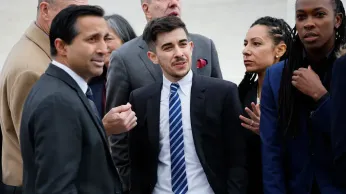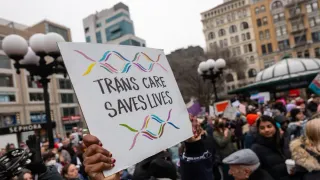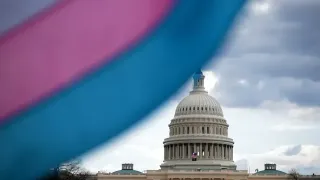
4 hours ago
Chase Strangio Reflects on Historic and Harrowing Supreme Court Argument for Transgender Rights
READ TIME: 3 MIN.
When Chase Strangio, an attorney and co-director of the ACLU’s LGBTQ & HIV Project, walked into the U.S. Supreme Court last December to argue United States v. Skrmetti, he was acutely aware of the gravity of the moment. Strangio became the first openly transgender person to argue a case before the nation’s highest court—a historic milestone in the ongoing fight for transgender rights in the United States .
The case, United States v. Skrmetti, centered on Tennessee’s SB1, a law that bans puberty blockers and hormone therapy for transgender youth under 18. The law was challenged by three transgender adolescents, their families, and a Memphis-based medical provider, who argued that it violated the Equal Protection Clause of the Fourteenth Amendment. For Strangio, who has personally benefited from gender-affirming care, the case was deeply personal as well as political .
On June 18, 2025, the Supreme Court delivered its decision: in a 6-3 ruling, the justices upheld Tennessee’s ban, determining that the law did not discriminate on the basis of sex or transgender status, and granting states broad authority to regulate gender-affirming care for minors . This decision leaves similar bans in more than 20 states intact, marking a devastating setback for transgender youth and their families nationwide.
Speaking to Democracy Now! after the ruling, Strangio described the experience as his “nightmare”—not only because of the personal and professional weight of arguing such a pivotal case, but also due to the ruling’s immediate impact on the lives of transgender people across the country. “In essence, the Supreme Court said that Tennessee’s law is not discriminatory,” Strangio explained, “which paves the way for the 24 laws that ban this care for adolescents in the United States to remain in effect” .
For Strangio, the stakes could not have been higher. In a New York Times op-ed published just before he stood before the Court, Strangio wrote, “My presence at the Supreme Court as a transgender lawyer will have been possible because I have had access to the very medical treatment at the center of the case. Though some doubt the lifesaving properties of this care, I know them personally. And so do my clients” .
After the ruling, Strangio issued a statement emphasizing the painful consequences: “Today’s ruling is a devastating loss for transgender people, our families, and everyone who cares about the Constitution. Though this is a painful setback, it does not mean that transgender people and our allies are left with no options to defend our freedom, our health care, or our lives. The Court left undisturbed Supreme Court and lower court precedent that other examples of discrimination against transgender people are unlawful. We are as determined as ever to fight for the dignity and equality of every transgender person and we will continue to do so with defiant strength, a restless resolve, and a lasting commitment to our families, our communities, and the freedom we all deserve” .
The Supreme Court’s decision has been met with anger and sorrow by LGBTQ+ advocates, medical professionals, and families who fear for the well-being and autonomy of transgender youth. Organizations like Lambda Legal and GLAAD have condemned the ruling, calling it discriminatory and harmful to vulnerable young people . Many have pledged to continue the fight in the courts, legislatures, and communities across the nation.
Despite the setback, Strangio’s presence at the Supreme Court stands as a testament to the resilience and determination of transgender people and their allies. It also highlights the ongoing need for visibility, advocacy, and legal action in the face of laws that threaten the rights and health of LGBTQ+ Americans.
As the dust settles from the Court’s decision, Strangio’s words and actions continue to inspire hope and resolve—a reminder that the struggle for equality is far from over.






